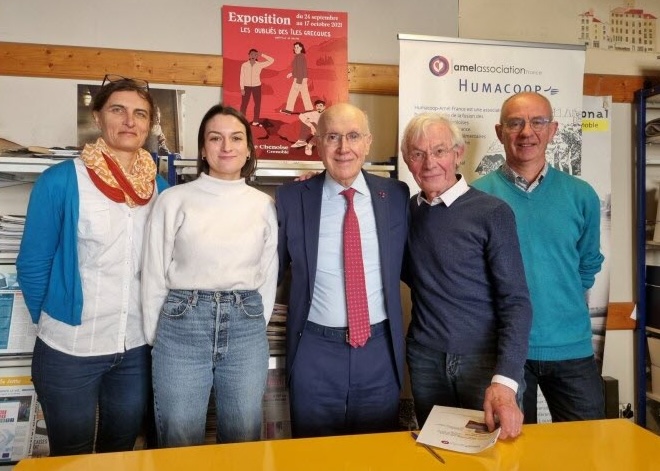In 1979, Dr. Kamel Mohanna founded the NGO Amel International in Lebanon. While the country is still in crisis, the organization now has 50 aid centers and 1,800 workers. Amel France’s branch is located in Grenoble, and it recently welcomed the Lebanese pediatrician, who studied in the Alpine capital. An encounter.
“Positive thinking and unwavering optimism.” This is one of the core beliefs of Amel International, a Lebanese non-governmental organization (NGO). Its president and founder, Kamel Mohanna, embodies this philosophy, as do all those who keep this organization alive—a presence since 1979 to respond to the successive crises that have hit Lebanon. Like a glimmer of hope in the midst of war, the wounded, and displaced populations…
PUTTING PEOPLE FIRST
Amel’s French branch is located in Grenoble and operates through the association Humacoop – Amel France, chaired by Dr. Guy Caussé. A few days ago, Dr. Mohanna visited and gave a lecture on the Middle East in this city he knows well, and where he ended up almost by chance to study medicine. “On the boat that brought me to France, with a friend, we wrote down three cities on a piece of paper: Grenoble, Amiens, and Nantes, and we drew one at random. The first name that came up was Grenoble,” he recalls. Just as he still remembers the freezing early mornings on the Saint-Martin-d’Hères campus, when he would hop on his bicycle.
After studying in Tours and returning to Grenoble, Kamel Mohanna became a pediatrician and got involved in Lebanese student associations.
Back home, he opened his pediatric practice and soon found himself treating those wounded by armed conflicts. In 1979, in response to the Israeli army’s invasion of southern Lebanon a year earlier, he co-founded Amel, a non-sectarian NGO, along with a group of doctors, journalists, and activists.
“The real launch of Amel was in 1982, after the second Israeli invasion. Very quickly, we became the largest organization during the war, with 29 centers, 30 ambulances, and 3 field hospitals. Doctors Without Borders and Médecins du Monde came to Lebanon through Amel. We evacuated 1,200 wounded to American hospitals with the ADC (American Arab Anti-Discrimination Committee), 550 were sent to France with Bernard Kouchner, then Minister of Foreign Affairs, and we fitted 400 prosthetics with the help of the Dutch government.”
For 55 years, the country has continued to live in a state of emergency, grappling with economic crises and deep political divisions. Amel International has therefore continued its work and today operates 50 centers, employs 1,800 workers—85% of whom are women—along with 500 volunteers and 24 mobile clinics.
“We provide a service rooted in the culture of solidarity, not charity, and we uphold human rights: the right to speak, to justice, to education, to a healthy environment.” — Dr. Kamel Mohanna
“We are independent and accepted by everyone, because our vision is to put people at the center,” emphasizes Dr. Mohanna. “We fight for human dignity and freedom.” The NGO’s roadmap is therefore humanitarian. There is, of course, emergency relief. But also service, development, and purpose… “We provide services within a culture of solidarity, not charity. And we uphold human rights: the right to speak, to justice, to education, to the environment…”
The NGO’s president also highlights the 3Ps that guide Amel’s actions: Principle, Position, Practice. “We think, we speak, and we act—we’re grounded in the real world.”
This was evident in recent months, when civil society organizations mobilized during an emergency: “Last September, 1.2 million people were displaced in just two days during the conflict. That’s a quarter of the population. Sixty to seventy percent of our staff were displaced from the South and the Bekaa Valley to Beirut. The next day, those nurses, teachers, etc., were already working in collective shelters and facilities to help the displaced. The humility of the displaced is something new. We’ve called it social cohesion—it’s a glimmer of hope.” A hope that calls for others, “for a fairer distribution of wealth, for a state of social justice, for the fight against climate change…”—all causes that Dr. Mohanna passionately advocates for.
“As a doctor, it’s inhumane to live for 55 years in a state of emergency. And it’s not over yet,” he concludes. “Back home, we have a saying: what’s the ultimate form of optimism? A Lebanese person telling you ‘see you tomorrow!’” he says with a smile. “That’s why we’re so resilient—we’re always prepared for the worst.”
Source: Marina Blanc, Le Dauphiné Libéré, Dimanche 23 mars 2025


 Creative Commons Attribution 4.0 International license
Creative Commons Attribution 4.0 International license